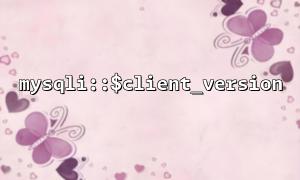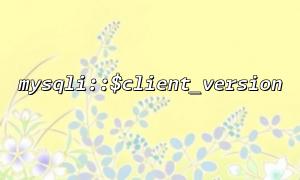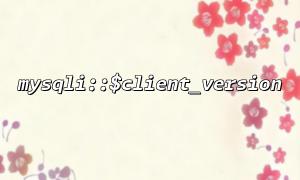First, it is important to clarify that mysqli::$client_version returns the version of the client library used for communication between PHP and MySQL, not the version number of the MySQL server. This is a common misunderstanding, as many developers mistakenly believe that it returns the version corresponding to the MySQL server.
Client Version refers to the version of the MySQL client library (e.g., libmysqlclient or MySQLnd) used when PHP is installed.
Server Version refers to the version of the MySQL server running.
If you have updated the MySQL server version, but the MySQL client library used by PHP has not changed, then the version number returned by mysqli::$client_version will naturally remain unchanged.
The root cause of this issue is that PHP and MySQL are two independent components. The MySQL client library used by PHP (e.g., MySQLnd or libmysqlclient) does not automatically update with changes to the MySQL server version. In other words, even if the MySQL server is updated, PHP will continue to use the client library version that was installed with PHP.
Suppose you have a MySQL server running version 8.0, but PHP is using MySQLnd 5.0. Even if you upgrade the MySQL server, mysqli::$client_version will still return MySQLnd 5.0, and it will not automatically update to MySQL 8.0.
To ensure that PHP uses the latest version of the MySQL client library, you may need to manually update the MySQL client library in PHP. Here are the steps:
Update PHP Extensions: First, make sure that the mysqli extension you are using is compatible with the version of MySQL. You can check the relevant extension settings in the PHP configuration file (php.ini) to ensure that the latest version of MySQLnd or libmysqlclient is enabled.
For MySQLnd users, you can directly confirm whether the mysqlnd extension is enabled in the PHP configuration file.
For libmysqlclient users, ensure that your PHP is linked with a client library compatible with the MySQL server version during compilation.
Recompile PHP: If your PHP installation does not include the latest version of the MySQL client library, you may need to recompile PHP and enable the appropriate client library version. The specific steps can be found in the PHP official documentation to ensure that PHP is compiled with the correct MySQL client version.
Use MySQLnd: It is recommended to use the MySQL Native Driver (MySQLnd) as the primary method of interaction between PHP and MySQL. MySQLnd not only performs better but also supports more MySQL features and is automatically optimized with PHP updates. Ensure that your PHP installation has the MySQLnd extension enabled and is using it as the default MySQL client library.
Although mysqli::$client_version only returns the client library version number, understanding the relationship between server and client versions is still very important. In most cases, the MySQL client library should support features and functionalities compatible with the server version. Specifically:
Backward Compatibility: MySQL client libraries are usually backward compatible, meaning that even if the client library version is lower, it can still communicate with newer MySQL server versions. However, this does not mean that you can use all the features of the new server version.
Forward Compatibility: If you are using an older client library (e.g., a version of libmysqlclient installed with an earlier version of PHP), it may not support new features of the MySQL server. In this case, upgrading the client library or using MySQLnd is a solution.
If you want to confirm the MySQL server version instead of the client library version, you can use the following SQL query:
<span><span><span class="hljs-keyword">SELECT</span></span><span> VERSION();
</span></span>This will return the version number of the current MySQL server, helping you distinguish it from the client version returned by mysqli::$client_version.
mysqli::$client_version returns the version of the client library used for communication between PHP and MySQL, not the version of the MySQL server. If you find that mysqli::$client_version always returns the same version number, it may be because the MySQL client library used by PHP has not been updated. Solutions to this issue include updating the MySQL client library in PHP, using MySQLnd, or recompiling PHP to ensure the use of the latest client library.
In the development process, understanding the difference between client and server versions is crucial for avoiding related issues and optimizing database operations.
Related Tags:
mysqli


